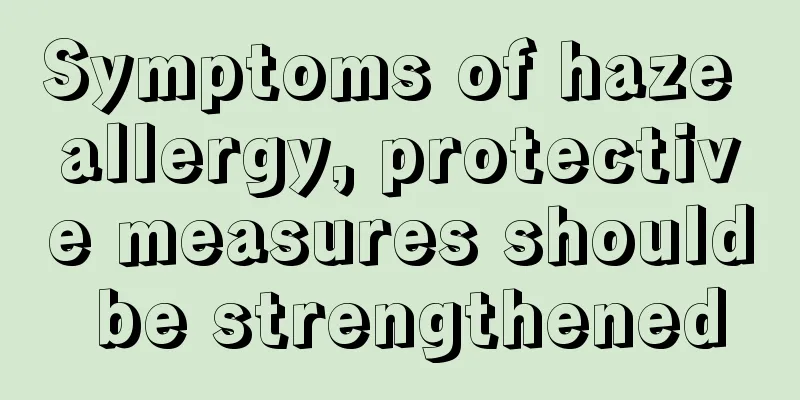Symptoms of haze allergy, protective measures should be strengthened

|
As winter approaches, North China, Northeast China and other regions are continuously plagued by smog. In such weather, some people with allergic skin will be troubled and prone to eczema and itchy skin. They should take protective measures before going out. 1. Allergic diseases increase in smog weather The survey found that the number of patients with allergic diseases, including eczema and urticaria, increased during smog weather, so it can be considered that smog weather can cause skin allergies. "We compared the diseases of people visiting dermatology departments during weather with high PM2.5 concentrations and clear weather and found that the number of patients with allergic diseases did increase during smog weather." There is a big difference between the "fog" and "haze" in smog: fog is formed by condensation of water vapor; while haze refers to a large number of extremely fine dry dust particles such as dust mites, sulfuric acid, nitric acid, organic hydrocarbons, etc. in the air, floating evenly in the air, making the air turbid, blurring the vision and causing visibility to deteriorate, especially for the human respiratory system and skin that are most directly in contact. 2. It is difficult to penetrate the skin but may cause discomfort Will small particles such as PM2.5 penetrate into the skin through the pores? This depends on the size of the particles and whether the skin barrier function is damaged. Normally, the secretions from the skin pores are leaked out rather than absorbed, so people don't have to worry about inhaling harmful particles through the skin like breathing. The main cause of skin discomfort is that the highly distributed PM2.5 dust in the air will fall on the skin surface, causing blockage of sebaceous glands and sweat glands, leading to dermatitis. For people with sensitive skin, some heavy metal particles and particles with chemical components in haze weather increase skin itching and even cause skin allergies. These chemicals are the culprits that cause allergies. When they fall on the skin, they will irritate the skin and damage the skin barrier; at the same time, these substances themselves are an allergen and cause skin allergies. Our skin barrier is like a 'brick wall' with a layer of 'putty' on the outside. Chemical substances will corrode and destroy the "putty" of the skin barrier. "If the corrosion is deep, it will penetrate deep into the skin. At the same time, after the barrier is destroyed, other allergenic substances from the outside world will penetrate into the skin, causing skin sensitivity and even allergies." 3. In addition to physical barriers, moisturizing and sun protection are essential How can we protect our skin in foggy weather? The simplest way is to reduce contact or use physical barriers. First of all, we should try to reduce going out, including morning exercises. If you really need to go out, you should take protective measures, such as wearing a mask, long-sleeved clothing, and a hat, and the mask should be washed promptly after wearing. After coming back from outside, you should wash your clothes and exposed skin promptly. |
<<: Does yuba have high nutritional value? The efficacy of yuba
>>: What can we do to reduce smog? Everyone has a responsibility
Recommend
How to care for glioma
Glioma is an intracranial tumor. If it is not tre...
What kind of illness can be caused by excessive anger
The increase in life pressure or even the frustra...
Will having tongue cancer shorten your life span?
We know that there are many patients suffering fr...
What acupuncture point is between the eyebrows
Working on acupuncture points on the human body i...
What is the fastest and most effective way to remove acne
When people find pimples on their faces, there is...
Prostate tumor marker research and development
Prostate tumor marker research and development Pr...
How to treat benign hemangioma? Treatment of benign hemangioma
Hemangioma is a benign tumor that often appears a...
What are the diagnostic methods for nasopharyngeal carcinoma?
In recent years, nasopharyngeal carcinoma has bec...
Three types of people will be in bad luck once they cheat
In today's society, cheating seems to have be...
Biological treatment of lymphoma
Survival period is a problem that patients and th...
What to do if your heart beats too fast
As the development of modernization continues to ...
What to do about venous vascular sclerosis and what to eat
I believe everyone is familiar with arteriosclero...
Can fresh lotus seeds be eaten raw
Whenever autumn comes, lotus pods grow after the ...
How to distinguish mint and coriander
There are certain differences between mint and fi...
What diseases will a persistent high fever cause and what are the consequences
Fever is one of the common diseases. Under normal...









